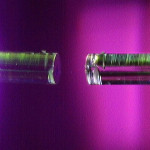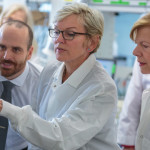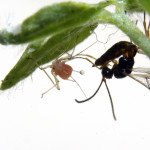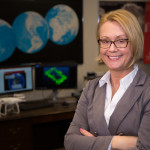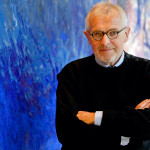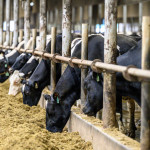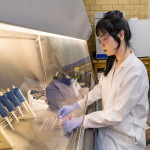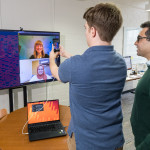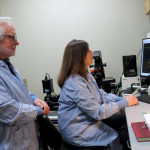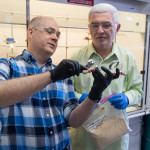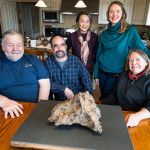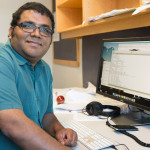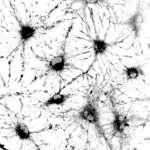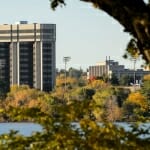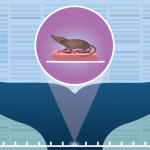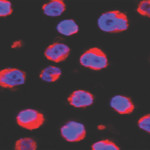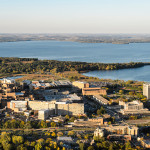Category Science & Technology
Small, cool and sulfurous exoplanet may help write recipe for planetary formation
UW–Madison astronomers and their collaborators hope the discovery of one exoplanet's sulfurous atmosphere will advance our understanding of how planets forms.
UW–Madison scientists develop most sensitive way to observe single molecules
The new method could have implications for pursuits as varied as drug discovery and the development of advanced materials.
Abandoned farmlands could play a role in fighting climate change. A new study shows exactly where they are.
A research team used machine learning to map nearly 30 million acres of United States cropland abandoned since the 1980s, creating a tool that could guide decisions about how to balance production of energy and food.
UW–Madison engineers mark 3D printing milestone in race to in-space manufacturing
Researchers at the University of Wisconsin–Madison have taken a step toward in-space manufacturing of replacement electronic components by successfully 3D printing RAM device units in zero gravity for the first time.
Stability relies on dispersal in parasitic relationship between aphids and wasps.
Researchers combined experiments with mathematical modeling to learn that dispersal of organisms involved in parasitic relationships through space can play an important role in balancing the effects of both ecology and evolution on those relationships.
UW–Madison physicist Francis Halzen elected to National Academy of Sciences
Halzen directs the UW–Madison Institute for Elementary Particle Physics Research and is the principal investigator of the IceCube Neutrino Observatory.
Update from UW–Madison experts on bird flu spread
UW experts are assisting efforts to track and research the virus with an eye toward minimizing risk to human health and protecting the state’s agricultural sector.
An electrifying discovery may help doctors deliver more effective gene therapies
The researchers exposed liver cells to short electric pulses — and those gentle zaps caused the liver cells to take in more than 40 times the amount of gene therapy material compared to cells that were not exposed to pulsed electric fields.
Popular social media apps use AI to analyze photos on your phone, introducing both bias and errors
An analysis of Instagram found that its vision model categorized more than 500 different "concepts," including age and gender, time of day, background images and even what foods people were eating in the photographs.
Nanomaterial that mimics proteins could be basis for new neurodegenerative disease treatments
The work centers around altering the interaction between two proteins that are believed to be involved in setting the stage for diseases like Alzheimer's, Parkinson's and amyotrophic lateral sclerosis, or ALS.
Eclipse throws shade, delighting campus
Hundreds crowded Library Mall Monday afternoon to peer up at a rare solar eclipse, as the UW–Madison Astronomy Club hosted a live viewing event from noon to 3:30 p.m.
UW–Madison researchers develop better way to make painkiller from trees
The process is primarily water based, relies on green solvents, and is continuous rather than a batch reaction, which makes it ideal for industrial applications.
Exceptional meteorite, plowed up from a Dane County field, finds new home in UW Geology Museum
The hunk of iron weighs in at nearly 110 pounds, is Wisconsin's 15th classified meteorite, and is the first ever recorded in Dane County.
Researchers reveal evolutionary path of important proteins
New research from the University of Wisconsin–Madison decodes the evolutionary pathway of regulatory proteins, the molecules that help control gene expression.
New tool provides researchers with improved understanding of stem cell aging in the brain
By identifying and decoding these autofluorescence signatures, the researchers have developed a tool that can aid in studying adult neurological diseases and aging, but potentially also expand beyond neuroscience.
UW unveils intellectual property models to build industry partnerships
With the Badger IP Industry Advantage program, companies interested in conducting research through the university can avoid some of the speed bumps that have slowed the transfer of technology from research to product.
Some lymphomas become resistant to treatment. Gene discovery may offer path to overcome it.
Researchers have been trying to understand why and how certain lymphoma treatments often stop being effective. Lixin Rui and his team believe they've found the reason — and a potential alternative treatment.
UW–Madison launches Sustainability Research Hub
The hub aims to bring significant interdisciplinary sustainability research funding to campus by connecting researchers across departments and targeting major federal research grants.


